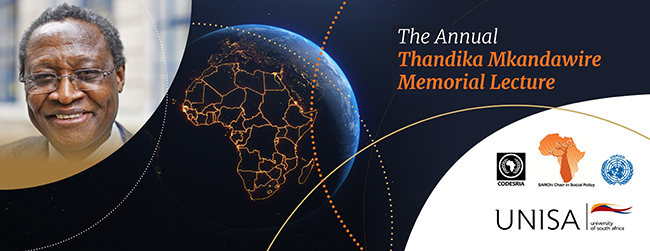
Professor Thandika Mkandawire was an exceptional African leader and contributor to economics, social policy, political sociology, and development studies. His contributions to the debates on democracy and the developmental state, economic restructuring, state-society nexus, and the idea of a transformative social policy have shaped our understanding of these areas of knowledge and policymaking.

The annual Thandika Mkandawire Memorial Lecture was established in 2021 to honour the intellectual contributions and the memory of Professor Mkandawire. The memorial lecture is an initiative of Unisa's College of Graduate Studies and the South African Research Chair in Social Policy, in partnership with the Council for the Development of Social Science Research in Africa (CODESRIA) and the United Nations Research Institute for Social Development (UNRISD).

Professor Fiona Tregenna
Professor Fiona Tregenna, the keynote speaker, described Mkandawire as a towering figure in his field and noted that his writings on industrialisation and related issues continue to have great relevance. In addition, some of his influential contributions to industrial development and policy still carry considerable weight, despite dating back to the 1980s. This includes his views on industry financing and social and industrial policy links.
The theme for the 2022 lecture and roundtable panel discussion was The feasibility of the developmental state project in Africa. Mkandawire defined a developmental state as one whose ideological underpinnings are developmental and earnestly attempts to deploy its administrative and political resources to economic development.
The panellists gave presentations on various topics to further interrogate the theme. In the various presentations, common concerns and challenges were mentioned. Chief among these is the impact of colonisation, which remains a challenge to Africa's development. The structural adjustment programmes also contributed to hindering Africa's developmental growth. In the deliberations, it was observed that it has become evident that industrialisation has been the impetus for development, failure and decline in various African countries. Factors such as low technology intensity and manufacturing, as well as poor competitiveness, are evidence of the challenges concerning industrialisation on the African continent. The economic performance in Africa also varies in space and time.
Development in Africa will constantly be affected by the external environment. Therefore, there needs to be an investigation that can specifically identify and address the unique challenges of each African country. Mkandawire's contributions encompass different developmental contributory factors, which will, without a doubt, continue to be revealed as scholars engage with his work. He is held in high esteem, and his insights will have an enduring impact on Africa and its development.
* By Hanli Wolhuter, Communication and Marketing Specialist and Musa Buthelezi, Intern, College of Graduate Studies
Publish date: 2022-11-24 00:00:00.0